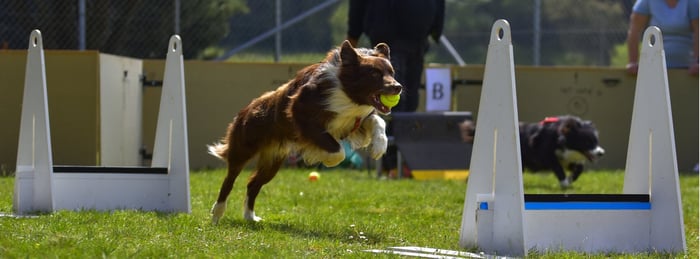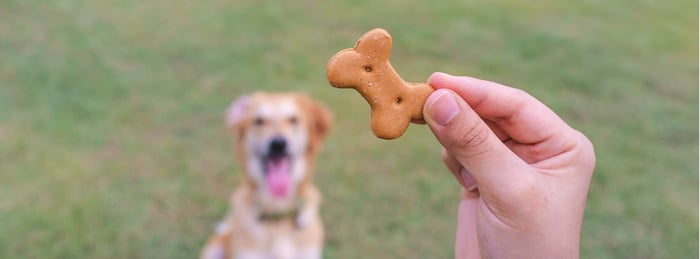Flyball Training Tips During the Off-Season with Aaron Robbins

1TDC™ recently had the chance to chat with Aaron Robbins, co-owner and co-captain of the Rocket Relay Flyball Club based out of the Hamilton, Ontario area, about flyball training tips during the off-season.
As an avid competitor and teacher, Aaron has plenty of knowledge to share with his fellow athletes—including valuable flyball training tips that can help flyballers stay active during the off-season.
Regardless of whether you’re a seasoned flyball veteran or a newbie to the sport, these flyball training tips may be just what you and your K9 athlete need to stay in shape during the cold winter months.
Question: When is off-season for flyball? What competition concludes the flyball season?
Aaron’s answer: I would say after the U-FLI (United Flyball League International, Inc.) Tournament of Champions, which is normally held around the first weekend of November, is when flyball teams usually take a break.
Question: What competition kicks off the new season?
Aaron’s answer: The new season, in my region, typically starts with the NAFA (North American Flyball Association) Region 2 Instant Replay Tournament in January.
Question: How much time does the average competitor take off? Aaron’s answer: I think in regions with snow most take off about 3-4 months.
Question: How much time do you personally take off?
Aaron’s answer: I take off 3 months
Question: Does “time off” just mean you aren’t going to competitions but are still training?
Aaron’s answer: Yes. I’m still training lightly on seasoned dogs, just practicing up-close drills and putting more focus on newer dogs, getting them up and going.
Question: Do you reduce the intensity of your training? If so, in what way? Aaron’s answer: During the off-season, it’s more about up-close skills, fewer reps, and less sprint work conditioning and more long hikes per week outside of flyball.
>> Interested in becoming a Flyball VIP Member? Check out our program HERE! <<
Question: How else does off-season flyball training differ? For example, do you reduce the amount of time spent on each training? Do you reduce the frequency? Do you change up what your training consists of?
Aaron’s answer: Yes, I reduce the amount of time and frequency of each training. I also do more work on things they struggle with and/or areas I’ve noticed they need a refresher of the skill.
Question: At what point do you then bring training back up to your usual active flyball season-level of intensity?
Aaron’s answer: In the spring as the weather improves. We start gradually increasing sprint work and swimming again until they are back up to where we left off.
Question: What flyball training tips can you offer other competitors on how to stay active and fluid during their downtime?
Aaron’s answer: Indoor swimming is great, as it has a lighter impact on joints and causes less wear and tear. Try going on hikes rather than doing sprints. Also, perform some body awareness work.
Question: Do you have specific flyball training tips for people who live in areas where it is cold and snowing in the winter?
Aaron’s answer: Indoor swimming, as mentioned, is a good choice. I’d also recommend finding a dirt horse arena to rent so you can do some light retrieve work or recalls. You may also want to use a treadmill or cross train in a different sport.
Question: Why is it important to remain active and fluid during downtime? Aaron’s answer: By staying active, it takes less time and physical demand to bring your dog back up to competition level.
It’s also less risk of injury than doing nothing and then trying to pick up where you left off. 1TDC™ would like to thank Aaron Robbins of Rocket Relay for providing some helpful flyball training tips and information.
We hope all of our flyballers enjoy some much-needed downtime and apply these tips to their own off-season training regimen. We’re looking forward to seeing Aaron and the rest of the Rocket Relay team compete next season!









